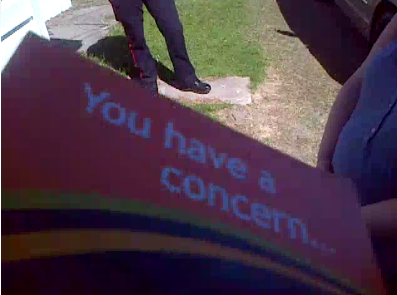Unpublished Opinions
Irony, satire and farce - these are a few of my favorite things.
“Mr. Rogers, it will be a short retainer”

The following is a true account of a child protection hearing for a motion made against us, the parents. This case is a bit unusual as the child protection agency is the complainant in a high-profile criminal court proceeding against the parents. To avoid a conflict of interest, the agency contracts the investigation to a sister agency. More background info, including cited letters, can be found on the author's page.
They call us, the parents, to courtroom one.
First, the agency lawyer asks us to say, on record, that we are not recording. She says they asked us to cooperate at the first home visit. She says we would not sign consent forms and that we would not cooperate. There is a second home visit where she says we refused to cooperate again. There was a third visit, at their office, which she says we secretly recorded. All videos, she says, have now been posted to the internet. She says we served a substantial amount of documentation in our responding materials that satisfy the agency’s concerns. She says it’s unfortunate that instead of sitting down and discussing the children, that we, the parents, “shoved a camera” in the workers face and refused to cooperate. She advises they are withdrawing the application and motion as the parent’s responding materials have addressed the agency’s concerns.
Our lawyer immediately requests that we be awarded court costs, as the agency had brought the matter to court unnecessarily. He points out the letter that the agency couriered to us the day before court. It outlines that not providing us a letter with the concerns was their “anti-oppressive intent” to avoid putting “too much pressure” on us, the parents. He points out that court could have been avoided, had the agency provided us with a letter stating the concerns, so that we could address them out of court. We had been requesting this information for over a month.
Our lawyer hands the couriered letter to the Judge. The Judge clarifies the request for costs by our lawyer in the amount of $750. Our lawyer explains that there was an alternative to court, citing another letter we received from the agency during our previous involvement. This letter was a result of the complaint we had made about the service we received from the agency. Our lawyer refers to Exhibit B in my affidavit, where the letter could be found.
The agency lawyer explains that they are a different agency, acting only as agents for the local child protection agency. She says she had no knowledge of this letter.
The letter clearly outlines that we, the parents, would have the concerns in writing, should the agency ever become involved with our family again.
The Judge reads this letter as well.
Our lawyer explains that the agency didn’t provide any communication of the protection concerns. Instead, they just brought the family to court. The family had no choice but to respond in court.
The agency lawyer says she had no knowledge of what the previous letter relates to. She said she knew nothing about the family’s history before this referral. She also says this was done intentionally to prevent any bias or conflict with the investigation.
She goes on to say that while the parents were “shoving” a camera in the worker’s face, they were also saying that they were refusing to cooperate and that we insisted they bring us to court. The agency lawyer says it would be inappropriate to award costs to “people largely the author of their own misfortune.”
Our lawyer responds, pointing out the 107-paragraph affidavit sworn by their agency, composed almost entirely of inaccurate historical information. He respectfully submits that if the agency did not know of the letter, they ought to have known.
The court takes a twenty-minute recess.
When court resumes, the Judge summarizes both sides of the case. He rules that it is reasonable to award the costs of court to us, the parents, in the amount of $750.
Court is adjourned.
Today is a beautiful day in the neighbourhood for us, and any Ontario family. Most people assume that when a family is brought to Family Court, that of course, they will have a chance to have their side heard. Unfortunately, this just is not true. Families are typically served a week before the hearing, leaving only a couple days to review, dispute, serve and file a counter argument. Even if the parent meets the strict deadline, a legal truism in Family Court is that if the Judge doesn’t have time, or just doesn’t want to read the parent’s responding material, he won’t. The Judge will err on the side of caution, and rule in favor of the Children’s Aid Society. This may include the passing of an intrusive motion that does little to help children and supports a “fishing trip” against the parents, causing undue stress and conflict within the family.
With the above ruling, my hope is that more Ontario Family Court Judges will read and consider the parent’s responding materials before making some prima facie ruling, based solely on the words of a broken child welfare system.
Sincerely,
Kelley Denham



Comments
Be the first to comment